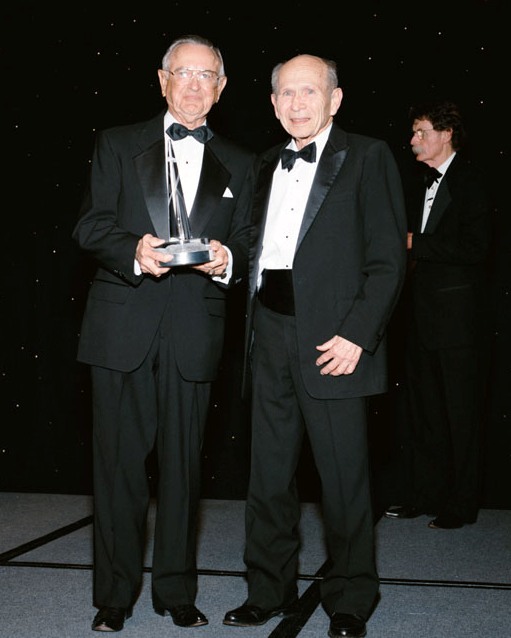1999 NATIONAL SPACE TROPHY RECIPIENT
Dr. Christopher C. Kraft Jr.

Christopher C. Kraft Jr. with Max Faget
Profile as published in March 12, 1999 program book. Author unknown.
Chris Kraft, a driving force in the U.S. human spaceflight program from its beginnings to the Space Shuttle era, a man whose accomplishments have become legendary, is the recipient of the 1999 National Space Trophy.
Dr. Kraft led the planning and operational control of programs from the two suborbital Mercury missions through Gemini, Apollo, Skylab, and the Apollo Soyuz Test Project. The first Mission Control Center at Johnson Space Center was largely a product of his thinking.
His leadership and unique contributions during a NASA career that included more than 10 years as director of Johnson Space Center have advanced human space flight and aerospace technology.
Dr. Christopher C. Kraft, Jr. was born on Feb. 28, 1924, in Phoebus, VA. He received his bachelor's degree in aeronautical engineering from Virginia Polytechnic Institute and State University in December 1944.
In January 1945, Dr. Kraft joined the Langley Aeronautical Laboratory of the National Advisory Committee for Aeronautics, the predecessor to NASA. There he made significant contributions in aeronautical flight research.
Shortly after NASA was formed in October 1958, Dr. Kraft was assigned to Project Mercury, one of the 36 original members of the Space Task Group. The group later became the nucleus around which the Manned Spacecraft Center, now Johnson Space Center, was formed. The group developed the basic concepts of the Mercury Project that launched the United States' human space flight program.
Dr. Kraft created the engineering and operations organization that designed the first flight trajectories and mission plans, and he developed and implemented standards for space flight operational control.
It was Dr. Kraft's foresight and leadership that saw the need to establish detailed contingency procedures to cope with the unexpected during space flight. That effort led to the development of light mission rules and operations procedures that were—and are—major elements in ensuring the safety of human space flight.
As flight director for the Mercury missions, Dr. Kraft was responsible for controlling the flight from lift-off of the launch vehicle to landing of the spacecraft. He did it exceptionally well. During Project Mercury, Dr. Kraft also oversaw the conceptual design, development and implementation of the Mission Control Center in Houston.
He directed mission planning and operational control of the Gemini Program from its beginning and was involved in the decision to move on toward landing an astronaut on the moon.
As director of flight operations, Dr. Kraft assumed the responsibility for defining the trajectory requirements and the programming of the ground and on board systems for complex maneuvers in space. He also directed the development of an advanced hardware-software system to provide comprehensive, high-fidelity simulations of space missions, including contingency operations.
Dr. Kraft continued to lead all aspects of flight operations until after the second lunar landing. Then, in December 1969, he was appointed deputy director of the Manned Spacecraft Center where he had complete associate responsibility for its overall management and direction.
He was named director in January 1972. In that capacity he led the human space flight team in its efforts to provide the means to safely send Apollo astronauts, trained to do scientific investigations, to the moon. He was largely responsible for the success of these complex missions to expand human capabilities and knowledge.
Dr. Kraft was deeply involved in the development of the Space Shuttle. During definition and design studies, he played a vital role in the decision-making process that created the Spaced Shuttle Program and determined the initial configuration of the Space Shuttle system, a new concept in space transportation.
He remained director of Johnson Space Center until his retirement in August 1982. Since his retirement from NASA, he has served as an aerospace consultant to Rockwell International, IBM and several other companies.
Dr. Kraft is an Honorary Fellow of the American Institute of Aeronautics and Astronautics. He is a member of the National Academy of Engineering, a corresponding member of the International Academy of Astronautics of the International Astronautical Federation, an honorary member of the Aerospace Medical Association and a fellow in the American Astronautical Society.
He served two terms as a director-at-large of the Houston Chamber of Commerce and two four-year terms as a member of the Board of Visitors at Virginia Polytechnic Institute and State University.
Many honors and awards have come to Dr. Kraft from aeronautical research societies and universities. Among them are honorary doctorates from the Indiana Institute of Technology, St. Louis University and Villanova University.
Other honors include the NASA Outstanding Leadership Medal from the President of the United States in 1963, the Spirit of St. Louis Medal from the American Society of Mechanical Engineers, the Space Flight Award and the W. Randolph Lovelace II Award from the American Astronautical Society, the Louis W. Hill Space Transportation Award from the American Institute of Aeronautics and Astronautics, the American Society of Mechanical Engineers ASME Medal and the National Order of the Legion of Honor of France.
NASA awards include three Distinguished Service Medals and as a special award in 1982, the distinguished service medal of the National Advisory Committee for Aeronautics (NACA).
Dr. Kraft is married to the former Elizabeth Anne Turnbull. They live in the Clear Lake area. They have two children: a son, Gordon, of San Francisco, and a daughter, Kristi-Anne, of Houston.
